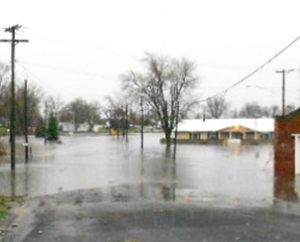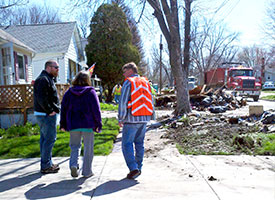By Megan Mertz
On the evening of Thursday, April 18, some 1,500 residents of Marseilles, Ill., got an unwelcome surprise: they had less than three hours to evacuate their homes before the area was inundated with floodwaters. A short time later, several barges on the Illinois River broke loose and damaged a nearby dam, hastening the evacuation.

“I only took a couple of pairs of shirts and slacks with me because I thought we’d be home in a few days,” said Nancy Frederick, a member of Trinity Lutheran Church, Marseilles, and one of the displaced residents.
But more than a week later, Nancy and her husband, Terry, still don’t know when — or even if — they will be able to return to their home, which was damaged by 5 to 6 feet of water.
“We’ve been working on our house for 44 years,” said Nancy. “We finally got it how we wanted, and it’s all gone now.”
The Fredericks are one of two families from Trinity, Marseilles, who suffered significant damage, according to the Rev. Jacob Ehrhard, who began serving as vacancy pastor at the church just two days after the flood.
LCMS congregations in many other communities of the Northern and Central Illinois districts have been affected by recent flooding as well. Damage assessments are still ongoing in the areas of Des Plaines, Lisle, Peoria and Beardstown. Ottawa, Washburn and Westchester sustained minimal damage, while flooding in Roanoke was more severe, according to Deaconess Tiffany Manor, who is coordinating recovery efforts on behalf of Lutheran Church Charities.
In the community of Roanoke, outside of Peoria, the flooding began a day earlier — on Wednesday, April 17 — when flash floods swept through town, damaging foundations and sewage systems.
Trinity Lutheran Church, Roanoke, was quick to respond to the needs of displaced residents by opening up the church fellowship hall to serve as an emergency shelter in cooperation with the Red Cross. The shelter was open Wednesday through Saturday, April 20, and the Rev. Bruce Scarbeary, pastor of Trinity, estimates that it housed about 15 people during its peak.
“It gave those who were being evacuated by the fire department a place to come, meet up with family and friends, and then move on to temporary housing,” said Scarbeary. “Those who needed a longer time to sort things out were able to stay for two to three days.”
The homes of two Trinity member families were severely damaged, and more than 25 local residents suffered extensive property damage. Trinity is helping to coordinate cleanup and is providing a central location where people can make donations and sign up to volunteer.
Within days of the flood, LCMS Disaster Response pledged $5,000 to Trinity, Roanoke, to aid in recovery efforts. With the first installment, Trinity was able to distribute $500 in gift cards for immediate clothing needs and house one family in a hotel.
Lutheran Church Charities has mobilized Lutheran Early Response Teams (LERTs) to aid the affected communities. LERT is a program of LCMS Disaster Response that trains individuals to respond with Christian care and practical service in the wake of a disaster. Northern Illinois District President Rev. Dan Gilbert estimates that there are more than 300 LCMS members in the district who have been trained in the LERT program.
“The church responds to disasters differently than secular agencies,” said Manor. “We will have volunteers coming in the days ahead, walking beside their brothers and sisters in Christ, bearing their burdens with them, sharing Christ’s love with all those affected.”
LCMS Disaster Response assists with both the immediate and long-term needs following natural and man-made disasters. The ministry continues to monitor recovery efforts in the affected communities.
“The spring of each year brings a flurry of activity for LCMS Disaster Response, and this year is no exception,” said the Rev. John Fale, associate executive director of LCMS Mercy Operations. “We are already receiving reports of flooding in numerous areas throughout the country. Additionally, we are assisting with the tragic explosion in West, Texas, and are working with the LCMS Atlantic and New Jersey districts as they continue their work after Superstorm Sandy.
“The response of our local pastors and their congregations and schools has been wonderful,” Fale added. “They are caring for people’s spiritual and physical needs just being who they are — the church. LCMS Disaster Response continues to support them in their work with on-site visits, long-term recovery planning and grants that help bring very tangible expressions of Christ’s mercy.”
To help those affected by recent disasters:
- make an online gift at https://www.lcms.org/givenow/disaster.
- mail checks payable to “The Lutheran Church—Missouri Synod” (with a memo line or note designating “LCMS Disaster Relief”) to The Lutheran Church—Missouri Synod, P.O. Box 66861, St. Louis, MO 63166-6861.
- call toll-free 888-930-4438 (8:10 a.m. to 4:10 p.m. CST, Monday through Friday).
Megan Mertz is a staff writer with LCMS Communications.
